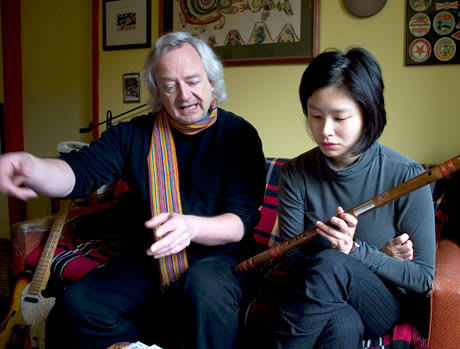This release by Rainer Wiens plots the latest facet of musical progression by one of Canada's most creative artists. The subtext of groove provides a rich base for compositions that are populated by a multi-level chorus of songs. These songs range from the literal representations of birds to interwoven melodies that dance with each other and have a remarkable habit of staying in the listener's memory. Wiens' extensive study of West African rhythms has informed much of this CD but it's nowhere near as straightforward as the simple application of rhythms. In "No Obvious Solution," for example, the groove cooks happily along, and one rests comfortably in its wake, but then the rhythms morph into permutations that leave Africa for parts unknown. This extrapolation is the result of a carefully thought-out method that takes each instrumental part and rephrases it to the point of vertigo - quite an ear-opening and remarkable experience. Wiens' sophisticated use of rhythm plus an adherence to clear and beautiful harmonic material has borne fruit in a music that someone can not only react to as a listener but, like all good popular music, can also comfortably inhabit as a participant. However, the music isn't the only thing that informs this CD. The title isn't simply a political slogan; it represents a lived experience.
What's the story behind the title?
Wiens: I was working on this music at the same time the political demonstrations were happening in Burma in 2007 and it brought up memories of a trip I made there in 1991. During that journey, I was smuggled across the border from Thailand to visit with the rebel Karen tribesmen. It was an incredible experience. Among many amazing things that happened there was a gamelan performance in the middle of the jungle by musicians who had to pile all their instruments on the backs of elephants and flee Burma because they made music that criticized the government. In spite of incredible hardship, the people in this camp were friendly and generous and I felt humbled by their ability to smile in the face of tragedy. As a result, I developed a strong attachment to this warm and courageous community. Sadly, all the friends I met there were later killed in raids by the Burmese military.
And how did this affect you in 2007
This memory gave me the emotional push to complete the music, get the ensemble organized and make the CD. I then decided to dedicate all the proceeds to the people of Burma via the Buddhist monks, who have set up an aid network that bypasses the military dictatorship.
(Independent)What's the story behind the title?
Wiens: I was working on this music at the same time the political demonstrations were happening in Burma in 2007 and it brought up memories of a trip I made there in 1991. During that journey, I was smuggled across the border from Thailand to visit with the rebel Karen tribesmen. It was an incredible experience. Among many amazing things that happened there was a gamelan performance in the middle of the jungle by musicians who had to pile all their instruments on the backs of elephants and flee Burma because they made music that criticized the government. In spite of incredible hardship, the people in this camp were friendly and generous and I felt humbled by their ability to smile in the face of tragedy. As a result, I developed a strong attachment to this warm and courageous community. Sadly, all the friends I met there were later killed in raids by the Burmese military.
And how did this affect you in 2007
This memory gave me the emotional push to complete the music, get the ensemble organized and make the CD. I then decided to dedicate all the proceeds to the people of Burma via the Buddhist monks, who have set up an aid network that bypasses the military dictatorship.
